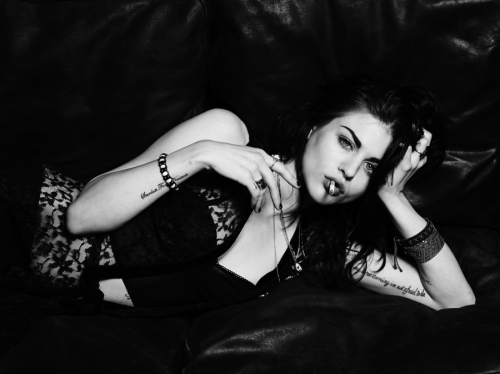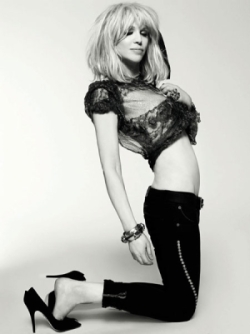

By Kim Voynar Voynar@moviecitynews.com
About a Girl …

These photos by Hedi Slimane of Frances Bean Cobain, now 18, have stirred a lot of chatter around the internet. I’ve seen everything from the obvious observation that she looks a lot like both her parents (shocking how genes work out that way), that she’s strikingly lovely in a dark, sad sort of way, to comments about her parentage and whether her life will be a tragic coda to theirs.
Here’s the thing, though: When I think of Kurt Cobain, I don’t think of someone who was a fuck-up or a loser or an addict. I think of the haunted, insular poet and musician whose music touched a generation. A lot of the greatest artists were screw-ups in their personal lives. And I would argue that the body of work many of them — Kurt Cobain included — contributed to their field of artistic endeavor exceeds the extent to which they may have had tragic personal stories.
Is the music of an artist like Cobain, or Amy Winehouse, or Janis Joplin, or Jimi Hendrix any less relevant because they also used drugs and died young? Are the writings of David Foster Wallace or Sylvia Plath any less relevant because their authors suffered from depression and committed suicide? Or we could argue about Roman Polanski, and whether the sexual assault of a 13-year-old girl completely trumps the artistry of his films. (I’ll watch his movies, okay, but I wouldn’t want him around my daughters.)
 These photos of Frances Bean Cobain stir us because we look at them and we see her dad staring at the camera through her frank blue eyes, because we look at in her youthful, rock-star royalty bad-assness, dyed black and tattooed and tough-yet-vulnerable, the cigarette present in many of the photos foreshadowing the potential for addictive behaviors, and we think, yup, that’s pretty much what you’d expect Kurt Cobain and Courtney Love’s daughter to look like. But much as she looks like her dad, as she’s shed the softer, rounder face and relative wide-eyed innocence of little girlhood, she’s developing an edgier look, and come to resemble her mother circa 1994 (left, from an Elle feature) as well.
These photos of Frances Bean Cobain stir us because we look at them and we see her dad staring at the camera through her frank blue eyes, because we look at in her youthful, rock-star royalty bad-assness, dyed black and tattooed and tough-yet-vulnerable, the cigarette present in many of the photos foreshadowing the potential for addictive behaviors, and we think, yup, that’s pretty much what you’d expect Kurt Cobain and Courtney Love’s daughter to look like. But much as she looks like her dad, as she’s shed the softer, rounder face and relative wide-eyed innocence of little girlhood, she’s developing an edgier look, and come to resemble her mother circa 1994 (left, from an Elle feature) as well.
There’s this palpable sense of excitement around these photos of Frances Bean, as if all of a sudden, everyone realizes they’ve been waiting to see them, waiting to see her, all grown-up. In a way, in these photos she looks very much a child of our collective imagining of what it must be like to be the daughter of Kurt Cobain and Courtney Love. Will she be extraordinary?
In Sylvia Plath’s 1962 radio play/poem Three Women, a new mother wishes only for her son to be “common”:
I do not will him to be exceptional.
It is the exception that interests the devil.
It is the exception that climbs the sorrowful hill
Or sits in the desert and hurts his mother’s heart.
I will him to be common,
To love me as I love him,
And to marry what he wants and where he will.
Given his own struggle with fame, I rather imagine that Cobain, like Plath, would have both accepted the inevitability of his daughter being drawn to life in the spotlight, and been saddened by that.
What will Frances Bean be, now that she’s all grown up? Will she be a brilliant songwriter? Can she sing? Technically, her singing debut could be said to be on the concept album Evelyn Evelyn, but according to this interview at Spinner with Dresden Dolls’ Amanda Palmer, who made the album, she just emailed a track of three seconds of her singing that was mixed in with everything else. She had her first gallery show (eight notebook sketches of “disturbed art,” whatever that means) in 2010, at the age of 17. And in 2009, she won a court battle to be legally separated from her mother and to live with her grandmother and aunt.
Now that she’s 18, she’s come into the trust from her father’s estate, and at this point in time the world is her oyster. Is Frances Bean a common teenager, or extraordinary by default because of who her parents are? Will she make her own mark upon the world in spite of the weight of lofty expectations? These photos might be indicative that she’s going to step into the limelight rather than aim for for the common. They capture, in stark black and white, Kurt Cobain’s little girl on the cusp of potential things-to-be; they are, you might say, a debutante moment of sorts. And they’re intriguing, at least in part, because they show her potential to be something interesting and artsy and smart.
At any rate, with these photos showing up everywhere, I bet that all over Hollywood, producers are lining up to get Frances Bean’s agent scripts featuring tattooed, black-haired, strong young women.















“I bet that all over Hollywood, producers are lining up to get Frances Bean’s agent scripts featuring tattooed, black-haired, strong young women.”
Yup. David Fincher must be kicking himself right about now.
Rob, no kidding.
and finchers never ever getting his hands on her cos fi8ncher ruinhed her life.; igs complicat6ed but bean knows it. and if he so much as o0uches her , hell get kineed ./ i mean with a gun.